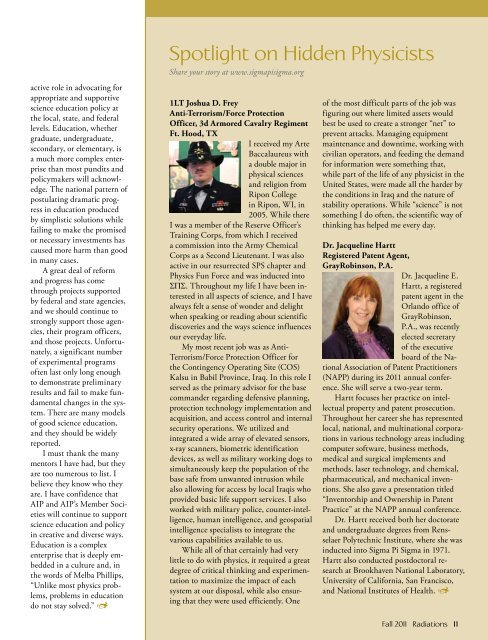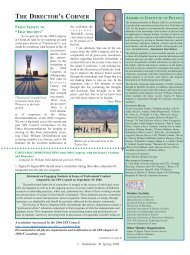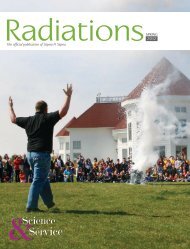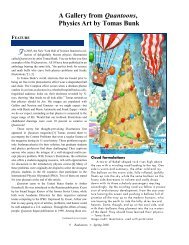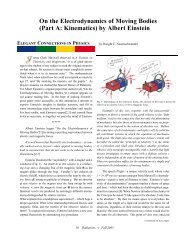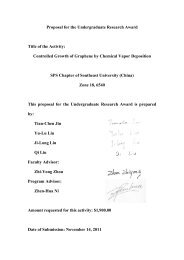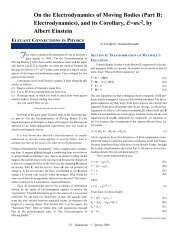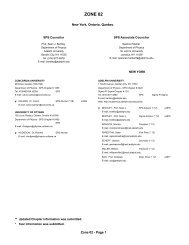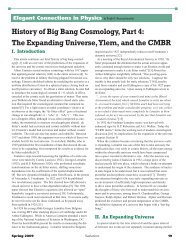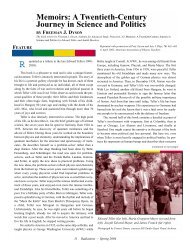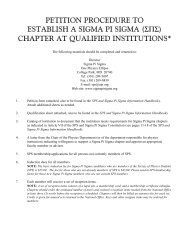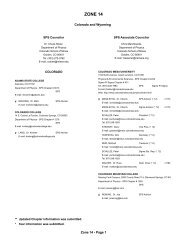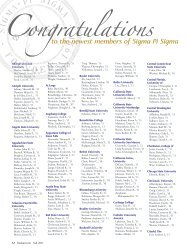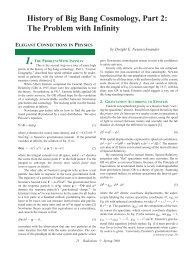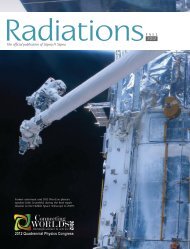Download a PDF of the entire issue - Sigma Pi Sigma
Download a PDF of the entire issue - Sigma Pi Sigma
Download a PDF of the entire issue - Sigma Pi Sigma
You also want an ePaper? Increase the reach of your titles
YUMPU automatically turns print PDFs into web optimized ePapers that Google loves.
active role in advocating for<br />
appropriate and supportive<br />
science education policy at<br />
<strong>the</strong> local, state, and federal<br />
levels. Education, whe<strong>the</strong>r<br />
graduate, undergraduate,<br />
secondary, or elementary, is<br />
a much more complex enterprise<br />
than most pundits and<br />
policymakers will acknowledge.<br />
The national pattern <strong>of</strong><br />
postulating dramatic progress<br />
in education produced<br />
by simplistic solutions while<br />
failing to make <strong>the</strong> promised<br />
or necessary investments has<br />
caused more harm than good<br />
in many cases.<br />
A great deal <strong>of</strong> reform<br />
and progress has come<br />
through projects supported<br />
by federal and state agencies,<br />
and we should continue to<br />
strongly support those agencies,<br />
<strong>the</strong>ir program <strong>of</strong>ficers,<br />
and those projects. Unfortunately,<br />
a significant number<br />
<strong>of</strong> experimental programs<br />
<strong>of</strong>ten last only long enough<br />
to demonstrate preliminary<br />
results and fail to make fundamental<br />
changes in <strong>the</strong> system.<br />
There are many models<br />
<strong>of</strong> good science education,<br />
and <strong>the</strong>y should be widely<br />
reported.<br />
I must thank <strong>the</strong> many<br />
mentors I have had, but <strong>the</strong>y<br />
are too numerous to list. I<br />
believe <strong>the</strong>y know who <strong>the</strong>y<br />
are. I have confidence that<br />
AIP and AIP’s Member Societies<br />
will continue to support<br />
science education and policy<br />
in creative and diverse ways.<br />
Education is a complex<br />
enterprise that is deeply embedded<br />
in a culture and, in<br />
<strong>the</strong> words <strong>of</strong> Melba Phillips,<br />
“Unlike most physics problems,<br />
problems in education<br />
do not stay solved.” r<br />
Spotlight on Hidden Physicists<br />
Share your story at www.sigmapisigma.org<br />
1LT Joshua D. Frey<br />
Anti-Terrorism/Force Protection<br />
Officer, 3d Armored Cavalry Regiment<br />
Ft. Hood, TX<br />
I received my Arte<br />
Baccalaureus with<br />
a double major in<br />
physical sciences<br />
and religion from<br />
Ripon College<br />
in Ripon, WI, in<br />
2005. While <strong>the</strong>re<br />
I was a member <strong>of</strong> <strong>the</strong> Reserve Officer’s<br />
Training Corps, from which I received<br />
a commission into <strong>the</strong> Army Chemical<br />
Corps as a Second Lieutenant. I was also<br />
active in our resurrected SPS chapter and<br />
Physics Fun Force and was inducted into<br />
ΣΠΣ. Throughout my life I have been interested<br />
in all aspects <strong>of</strong> science, and I have<br />
always felt a sense <strong>of</strong> wonder and delight<br />
when speaking or reading about scientific<br />
discoveries and <strong>the</strong> ways science influences<br />
our everyday life.<br />
My most recent job was as Anti-<br />
Terrorism/Force Protection Officer for<br />
<strong>the</strong> Contingency Operating Site (COS)<br />
Kalsu in Babil Province, Iraq. In this role I<br />
served as <strong>the</strong> primary advisor for <strong>the</strong> base<br />
commander regarding defensive planning,<br />
protection technology implementation and<br />
acquisition, and access control and internal<br />
security operations. We utilized and<br />
integrated a wide array <strong>of</strong> elevated sensors,<br />
x-ray scanners, biometric identification<br />
devices, as well as military working dogs to<br />
simultaneously keep <strong>the</strong> population <strong>of</strong> <strong>the</strong><br />
base safe from unwanted intrusion while<br />
also allowing for access by local Iraqis who<br />
provided basic life support services. I also<br />
worked with military police, counter-intelligence,<br />
human intelligence, and geospatial<br />
intelligence specialists to integrate <strong>the</strong><br />
various capabilities available to us.<br />
While all <strong>of</strong> that certainly had very<br />
little to do with physics, it required a great<br />
degree <strong>of</strong> critical thinking and experimentation<br />
to maximize <strong>the</strong> impact <strong>of</strong> each<br />
system at our disposal, while also ensuring<br />
that <strong>the</strong>y were used efficiently. One<br />
<strong>of</strong> <strong>the</strong> most difficult parts <strong>of</strong> <strong>the</strong> job was<br />
figuring out where limited assets would<br />
best be used to create a stronger “net” to<br />
prevent attacks. Managing equipment<br />
maintenance and downtime, working with<br />
civilian operators, and feeding <strong>the</strong> demand<br />
for information were something that,<br />
while part <strong>of</strong> <strong>the</strong> life <strong>of</strong> any physicist in <strong>the</strong><br />
United States, were made all <strong>the</strong> harder by<br />
<strong>the</strong> conditions in Iraq and <strong>the</strong> nature <strong>of</strong><br />
stability operations. While “science” is not<br />
something I do <strong>of</strong>ten, <strong>the</strong> scientific way <strong>of</strong><br />
thinking has helped me every day.<br />
Dr. Jacqueline Hartt<br />
Registered Patent Agent,<br />
GrayRobinson, P.A.<br />
Dr. Jacqueline E.<br />
Hartt, a registered<br />
patent agent in <strong>the</strong><br />
Orlando <strong>of</strong>fice <strong>of</strong><br />
GrayRobinson,<br />
P.A., was recently<br />
elected secretary<br />
<strong>of</strong> <strong>the</strong> executive<br />
board <strong>of</strong> <strong>the</strong> National<br />
Association <strong>of</strong> Patent Practitioners<br />
(NAPP) during its 2011 annual conference.<br />
She will serve a two-year term.<br />
Hartt focuses her practice on intellectual<br />
property and patent prosecution.<br />
Throughout her career she has represented<br />
local, national, and multinational corporations<br />
in various technology areas including<br />
computer s<strong>of</strong>tware, business methods,<br />
medical and surgical implements and<br />
methods, laser technology, and chemical,<br />
pharmaceutical, and mechanical inventions.<br />
She also gave a presentation titled<br />
“Inventorship and Ownership in Patent<br />
Practice” at <strong>the</strong> NAPP annual conference.<br />
Dr. Hartt received both her doctorate<br />
and undergraduate degrees from Rensselaer<br />
Polytechnic Institute, where she was<br />
inducted into <strong>Sigma</strong> <strong>Pi</strong> <strong>Sigma</strong> in 1971.<br />
Hartt also conducted postdoctoral research<br />
at Brookhaven National Laboratory,<br />
University <strong>of</strong> California, San Francisco,<br />
and National Institutes <strong>of</strong> Health. r<br />
Fall 2011 Radiations 11


